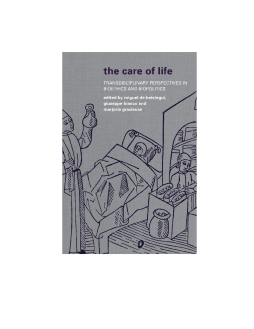
Additional Information
Book Details
Abstract
This interdisciplinary collection of essays demonstrates how the ethical and political problems we are confronted with today have come to focus largely on life. The contributors to this volume define and assess the specific meaning of life itself. It is only by doing so that we can understand why life has become an all-encompassing problem, why all questions, especially ethical and political, have become vital questions. We have reached a moment in history where every distinction and opposition is no longer in relation to life, but within it, and where life is at once a theoretical and practical problem.
This book throws light on this nexus of problems at the heart of contemporary debates in bioethics and biopolitics. It helps us understand why and how life is understood, valued, cared for and framed today. Taking a genuinely transdisciplinary approach, these essays demonstrate how life is a multifaceted problem and how diverse the origins, foundations and also consequences of bioethics and biopolitics therefore are.
Miguel de Beistegui is professor of philosophy at the University of Warwick, UK. His many publications include Aesthetics After Metaphysics (Routledge, 2012), Proust as Philosopher (Routledge, 2012), Immanence and Philosophy: Deleuze (Edinburgh University Press, 2010) and The New Heidegger (Continuum, 2005).
Giuseppe Bianco is a postdoctoral Leverhulme research assistant at the University of Warwick, UK. He is co-editor of Badiou and the Philosophers (Bloomsbury, 2013).
Marjorie Gracieuse is a postdoctoral Leverhulme research assistant at the University of Warwick, UK.
Contributors: Katherine Angel, Leverhulme Trust Fellow (Queen Mary, University of London); Robert Bernasconi, Edwin Erle Sparks Professor of Philosophy (University of Pennsylvania, USA); Giuseppe Bianco, postdoctoral Levehulme research assistant (University of Warwick, UK); Florence Caeymaex, Professor of Philosophy (Université de Liège, Belgium); Lorenzo Chiesa, Professor of Modern European Thought (University of Kent, UK); Miguel de Beistegui , Professor of Philosophy (University of Warwick, UK); Piergiorgio Donatelli, Professor of Philosophy (Sapienza University of Rome, Italy); Steve Fuller, Auguste Comte Chair in Social Epistemology (University of Warwick, UK); Marjorie Gracieuse, postdoctoral Leverhulme research assistant (University of Warwick, UK); Hector Kollias, Lecturer in French (King’s College London, UK); Guillaume LeBlanc, Professor of Philosophy (Université Michel de Montaigne, Bordeaux 3, France); Paul-Antoine Miquel, Professor of Philosophy (Université de Toulouse, France); Julien Pieron, Research Associate (Université de Liège, Belgium); Aaron Schuster, Research Fellow (Institute for Cultural Inquiry, Berlin, Germany); Patrick Singy, Fello (Columbia University, UK); Claudia Stein, Associate Professor of History (University of Warwick, UK); Sander Werkhoven, PhD candidate (University of Warwick, UK); Charles Wolfe, Research Fellow in Philosophy (University of Ghent, Belgium); Andy Wong, PhD candidate (University of Ghent, Belgium); Frédéric Worms, Professor of Philosophy (Ecole normale supérieure, France)
This collection of essays is based on the hypothesis that the question of life has become an all-encompassing problem in current debates in the social science and humanities. The Care of Life is a valuable contribution to a great variety of fields reaching from bioethics and biopolitics to political economy and psychoanalysis as well as from 19th century philosophy of biology to 21st century philosophy of science. It is a must read for anyone interested in going beyond reductivist accounts of life.
Vanessa Lemm, is Professor of Philosophy at the University of New South Wales, Australia.
The notion of life is today as complex and puzzling as ever, notwithstanding the advances in and proliferation of the life-sciences over the past century. In this important collection of essays, a group of leading thinkers take stock of a philosophical tradition which approaches the puzzles of life not just in scientific terms, but with the resources of ontology, politics, history and critical theory. This is a collection that can be expected to produce fertile offspring.
Wayne Martin, University of Essex
